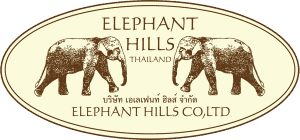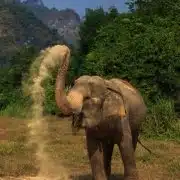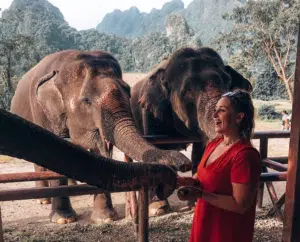Elephant Hills supports vital research on Asian elephants

Our Elephant Conservation Project aims to help both domestic and wild elephants in Thailand. We do this by donating essential medical equipment and elephant food to Thailand’s government run elephant hospitals. We also make donations to aid the National Parks and Wildlife Sanctuaries that are battling with human-elephant conflict. Furthermore, we feel that it’s important to do our part in contributing to elephant research. After all, knowing more about Asian elephants can ultimately benefit both captive and wild populations.
Elephant research in Thailand
Over the years, we have been supporting Chiang Mai University’s Elephant Research and Education Center in different ways. We have contributed to their research both monetarily and by providing information of our elephants for their research. In addition, we have donated medical supplies to be used by the center’s mobile clinic.
In this, most recent project we donated funds to help with the university’s research on Elephant endotheliotropic herpesvirus (EEHV). This virus can be found both in captive and wild populations. It occurs in both Asian and African elephants and is often lethal to young calves aged approximately 1-12 years.
More knowledge needed for tackling the EEHV
Further research on this detrimental virus is vital. EEHV can cause an acute hemorrhagic disease with a very high mortality rate in Asian elephants. At the moment, there is no vaccine available. If detected early, the disease can be treated with immediate application of antiviral drugs. However, unfortunately the treatment is very expensive and only partially effective.
In addition to this most recent research, the Elephant Research and Education Center is doing an outstanding job in creating awareness of the virus. In co-operation with the government run elephant hospitals, many elephant owners and camps have been educated on the early symptoms related to the virus.
For instance, a couple of years ago posters with detailed information and pictures for identifying EEHV symptoms were distributed to elephant camps all over Thailand. Early detection is definitely the key in tackling the virus. Thanks to the wonderful efforts by Chiang Mai University and other Thailand’s elephant experts, an increasing number of baby elephants receive help in time. Consequently, more elephant lives can be saved.
We are currently looking for partners to co-operate with our Elephant Conservation Project through corporate sponsorship. Please contact us at [email protected] to learn more and discuss the options!
Stay up to date about the latest developments at Elephant Hills! Sign up for our newsletter now.





